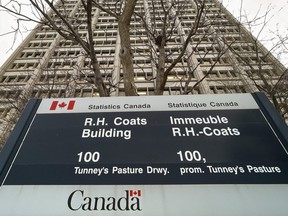Unemployment up sharply for immigrants and temporary residents.
Article content
The employment reports coming out of Ottawa and Washington on Friday really showed a tale of two countries.
Advertisement 2
Article content
In Canada, the unemployment rate was up to 6.4%, there was a net loss of 1,4000 jobs lost and fewer people were looking for work. In the United States, there were more than 200,000 net new jobs created and the unemployment rate ticked up to 4.1% because more people were looking for work.
The economic confidence in the U.S. has resulted in calls for the Federal Reserve to cut interest rates sooner and faster. Here, there are concerns a second rate cut won’t come quite as quickly as wage growth continues to outpace inflation.
Wage growth may sound like a good thing but not when it is concentrated in government jobs, in particular the federal public service, as a recent report from Desjardins showed. Add to that the ongoing job gains in the public sector versus the private sector and you start to see an economy that isn’t as healthy as it should be.
Article content
Advertisement 3
Article content
The big problem that continues to persist in Canada’s jobs market, though, is that once again, population growth driven by temporary workers and international students is outpacing job growth. That, of course, leads to a number of other problems that cascade through society.
“Excessive population growth particularly in the temps category is responsible for a rising unemployment rate and it is of no service to anyone to candy coat this fact,” Scotiabank VP and head of Capital Markets Derek Holt said in a note to bank clients on Friday.
“Population is up by 1.1 million people year-over-year as housing affordability pressures mount, rent is soaring, classrooms are getting packed and ERs are clogged. A+ Canada …”
Advertisement 4
Article content
The government has known that population growth has been putting a strain on the labour market since at least last summer. That’s when Statistics Canada began to issue warnings in their monthly jobs report that things were not looking good, that population growth was vastly outpacing job growth.
At the beginning of April, Prime Minister Justin Trudeau was incredibly blunt when speaking about the issue at a news conference in Halifax.
“Whether it’s temporary foreign workers or whether it’s international students in particular, that have grown at a rate far beyond what Canada has been able to absorb,” Trudeau said.
“Increasingly, more and more businesses are relying on temporary foreign workers in a way that is driving down wages in some sectors.”
Advertisement 5
Article content
Faster than we can absorb. Driving down wages.
If only Trudeau knew someone who could do something about this?
I mean, he could do something given that he is the prime minister. Beyond that, he could ask Marc Miller, his immigration minister and a man so close that he was in Trudeau’s wedding party.
There are no signs that the government has any intention of slowing down the immigration numbers, temporary or otherwise.
Meanwhile, a Bloomberg analysis shows that people who are temporary residents or recent immigrants within the last five years are facing declining employment prospects. The unemployment rate for temporary residents was 11% in June compared to 12.6% for those who immigrated in the last five years.
Advertisement 6
Article content
Recommended from Editorial
As Holt said, the massive spike in immigration is not only pushing up unemployment in some sectors but has an impact on housing, access to health care, education and more.
The Trudeau government needs to deal with this issue and that means rolling intake numbers back to a manageable level.
So far, all we’ve heard from Miller is a plan to reduce temporary immigration numbers by making temporary residents permanent and dealing with rising asylum numbers by purchasing hotels to housing them. Neither solution deals with the root cause, it just tries to hide the problem.
We need real solutions, or to accept a declining job market and economy.
RECOMMENDED VIDEO
Article content



